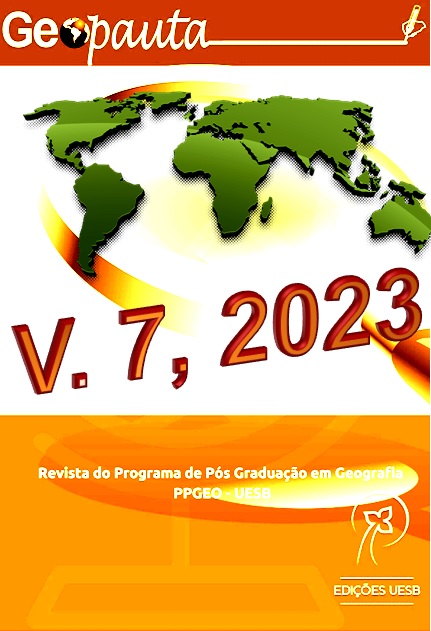Reggae in São Luís: cultural identity and the emergence of brazilian Jamaica
DOI:
https://doi.org/10.22481/rg.v7.e2023.e11964Keywords:
Reggae, Cultural Identity, Brazilian Jamaica, São Luís, MaranhãoAbstract
This article discusses the arrival and consolidation of reggae in São Luís. It appears that São Luiz is the territory outside Jamaica where the musical genre is most successful, having incorporated by its population, mainly by blacks, a series of particular habits during the appropriation of Jamaican reggae, in this way, the regueiro of São Luís created unique bonds with Jamaican rhythm and that relationship endures to the present day. These aspects contributed to São Luís being conceived as 'Brazilian Jamaica'. The objective of the research is to analyze the relationship between reggae and the population of Ludovic, its particularities and symbolism. As a result, it was identified that the relationship between society and reggae existing in São Luís has singularities, which express historical, cultural, racial and resistance aspects.
Downloads
Metrics
References
ARAÚJO, Elaine Peixoto. O reggae ludovicense: uma leitura do seu sistema léxico semântico. Revista Philologus – Círculo Fluminense de Estudos Filológicos e Lingüísticos –Ano 10, Número 28, Rio de Janeiro: CiFEFil, 2004.
BRASIL, Marcus Ramúsyo de Almeida. O reggae no Maranhão: sociologia da cultura e produção simbólica. Aurora Revista de Arte, Mídia e Política, n. 12, p. 88-101, 2011.
Jornal O Imparcial. Quinta do Reggae é suspensa temporariamente no Centro Histórico. 2019. Disponível em: https://oimparcial.com.br/entretenimento-e-cultura/2019/08/quinta-do-reggae-e-suspensa-temporaria-no-centro-historico/> Acesso realizado em agosto de 2021.
MORAIS, Maria do Carmo Lima. A invenção da expressão “Jamaica brasileira”. Revista Cambiassu, São Luís, ano, v. 18, p. 126-141, 2008.
MORAIS, Maria do Carmo Lima; ARAÚJO, Patrícia Carla Viana. O reggae, da Jamaica ao maranhão: presença e evolução. In: Encontro de Estudos Multidisciplinares em Cultura, 4., 2008, Salvador. IV Encontro... Salvador: ENECULT, 2008. Disponível em: <http://www.cult.ufba.br/enecult2008/14539.pdf >. Acesso realizado em agosto de 2021.
PENHA, Talita Lima. Reggae, Identidade Cultural e Atividade Turística de São Luís do Maranhão. 64 f. Trabalho de Conclusão de Curso (Monografia). Universidade de Brasília, 2003.
SANTOS, Fábio Abreu. Produção e consumo do reggae das radiolas em São Luís/MA: significados, simbolismo e aspectos mercadológicos. 245 f. Dissertação (Mestrado). Universidade Federal da Paraíba, João Pessoa, 2009.
SANTOS, Milton. Por uma outra globalização: do pensamento único à consciência universal. São Paulo: Record. 2000.
SILVA, Carlos Benedito Rodrigues da. Da terra das primaveras à ilha do amor: reggae, lazer e identidade cultural. São Luis: Editora EDUFMA, 1995.
Downloads
Published
How to Cite
Issue
Section
License
Copyright (c) 2023 from the Geopauta Journal and the Author(s)

This work is licensed under a Creative Commons Attribution 4.0 International License.
Copyright
Authors must retain unrestricted copyright and grant the Geopauta the first publication with the work simultaneously licensed under CC BY which allows others to share with recognition of each author's authorship in the initial publication in this Journal
Intellectual Property and Terms of Use
Geopauta adopts the Free Access policy in accordance with Open Access - OAC recommended by DOAJ and in accordance with the SciELO Criteria, under a Creative Commons CC By Attribution 4.0 International License, allowing immediate free access to the work and allowing any user to read, download, copy, distribute, print, search or link to the full texts of the articles, track them for indexing, pass them as data to software or use them for any other legal purpose.
Geopauta attributes the CC BY. license. where it is allowed without restrictions:
Share — copy and redistribute the material in any medium or format for any purpose, even commercial. as long as they give due credit for the original creation.
Adapt — remix, transform, and create from the material for any purpose, even commercial purposes, as long as due credit is given for the original creation.












